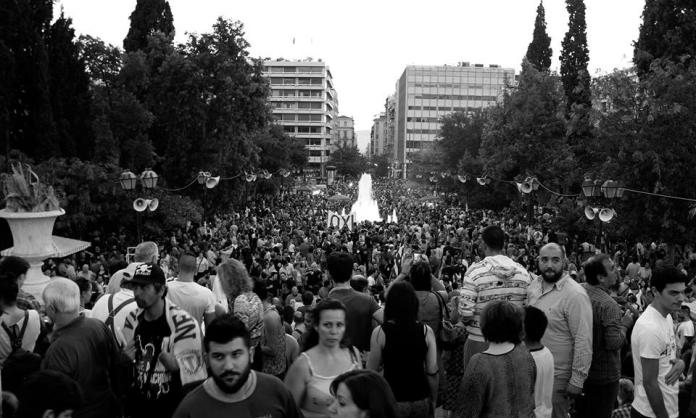Europe has been thrown into chaos and a new and volatile situation has opened in Greece. Greek prime minister Alexis Tsipras of the left wing Syriza party has called a referendum on whether the country should accept punitive austerity measures demanded by the troika of the European Commission, the European Central Bank and the International Monetary Fund.
These institutions, directed by the European ruling classes, are attempting to strangle the Greek economy and send a message to workers throughout the continent that there is no alternative to a neoliberal Europe.neoliberal Europe. Red Flag’s Colleen Bolger is reporting from the streets of Athens over this next decisive week.
----------
Alexis Tsipras' announcement after midnight on Friday that he would call a referendum on 5 July on the deal proposed by the EU institutions has broken all the rules. Prime ministers rarely ask the people who elected them what they think. Negotiations over matters of finance and state are conducted by ministers and the heads of banks in fine hotels. But for one week, these matters will unfold principally in the streets, cafes and workplaces of Greece.
In Syntagma Square, many among the tens of thousands who had come to the rally initiated but not formally called from within Syriza.
Many attendees wanted to make clear that this was a question of democracy. “This should have been done not only now, but five years ago”, said Steven, a student who like many there was not a member of Syriza or any political party but had voted for them. “Our families and our friends have suffered a lot from pension cuts and job cuts and after 5 years this program hasn’t done anything.”
Four years earlier to the day, the same spot where we were talking had been thick with tear gas as riot police battered 50,000 people who were trying to stop the vote on the first Memorandum.
Alexis carried the placard last night that he’d made for that earlier demonstration. It said, “Our dreams are what keep us awake”. It is a reference to the slogan “We are awake”, which was raised in Athens in response to the Indignados movement in Spain, which had asked the people of Europe: “Are you awake?” It was a call to follow their example and spread the occupations.
Today it is the Greek example that everybody is watching. Everyone I spoke to at the rally was acutely aware of the significance of the referendum for Europe.
Fokionas, a young member of Syriza said he is open to a deal but not the one on offer. What Europe’s rulers fear, he said, are not the financial but the political consequences of a Greek rejection. He was conscious of how a no vote will impact on the elections in Spain in September, on people in Portugal, Ireland and perhaps even Italy. “What they are so afraid of is a new rising of the people of Europe”, he said.
This is exactly what has driven the intransigence of the troika since February. As columnists question whether the Eurogroup pushed Greece too far, we should recall German chancellor Angela Merkel’s warning to Greek voters in January. She said that if they voted in a government that refused to pay their debt, they would get no succour from the rest of Europe. From the beginning, the troika have wanted to teach the Greek people a lesson that would be marked in Barcelona, Dublin and Turin – there is no alternative to austerity.
The European ruling classes so far this century have headed off challenges to their vision of normalcy under 21st century capitalism: the traditional parties of left and right being thrown into turmoil, the Indignados, protests of hundreds of thousands and general strikes in Greece.
The establishment is used to getting its way, which is why the rich are mortified by the prospect that waiters, taxi drivers and cleaners could bring that to an end. That is what is at stake on 5 July.
If the tone of European Commission president Jean-Claude Juncker at his press conference yesterday reflects the desperation of a ruling class in crisis, Merkel’s much sterner appearance reminds us that they will use every weapon at their disposal. They have the media and the parties of the right inside Greece campaigning vigorously for a yes vote.Juncker at his press conference yesterday reflects the desperation of a ruling class in crisis, Merkel’s much sterner appearance reminds us that they will use every weapon at their disposal. They have the media and the parties of the right inside Greece campaigning vigorously for a yes vote.
Crucially, the European Central Bank's decision to end the ELA, the lending instrument meant to be available to ensure the solvency of Eurogroup members' banking systems, was designed to inflict maximum chaos in the lead up to Sunday. The Greek government’s response – closing the banks and the share market for a week and limiting withdrawals at ATMs – was a vital counter measure against a bank run and the acceleration of capital flight. If the vote took place in an atmosphere of panic it would be much more favourable to Europe’s rulers.
It also points to how it is possible to impose democratic control over the banking system, usually presented as operating according to the autonomous laws of the market. Some branches reportedly will open to allow only pensioners, some of whom don’t have cash cards or know how to use an ATM, to withdraw their pension. The choice to allow people to access cash to go about their lives but stop investors from shifting millions to overseas accounts shows that there need not be a separation of politics and economics.
The government has also announced that public transport will be free all week. The union covering doctors has said there will be no charge for examinations. These are practical ways of demonstrating what an alternative to austerity would look like.
Do not doubt that Tsipras means to win the referendum. As people gathered in Syntagma Square, he gave an interview reiterating that his government could not implement the measures in the draft agreement of 26 June.
However, he also said that a strong no vote would strengthen his hand in the negotiations. This is at odds with the position of many on the left within and outside of Syriza, who say that a deal is impossible when all that is being negotiated is the extent of the austerity Greece must bear.
The referendum is more than just a vote. It is a social mobilisation of left and right, of class. It is also more than just acceptance or rejection of a particular draft agreement. The question of austerity itself is at stake.











